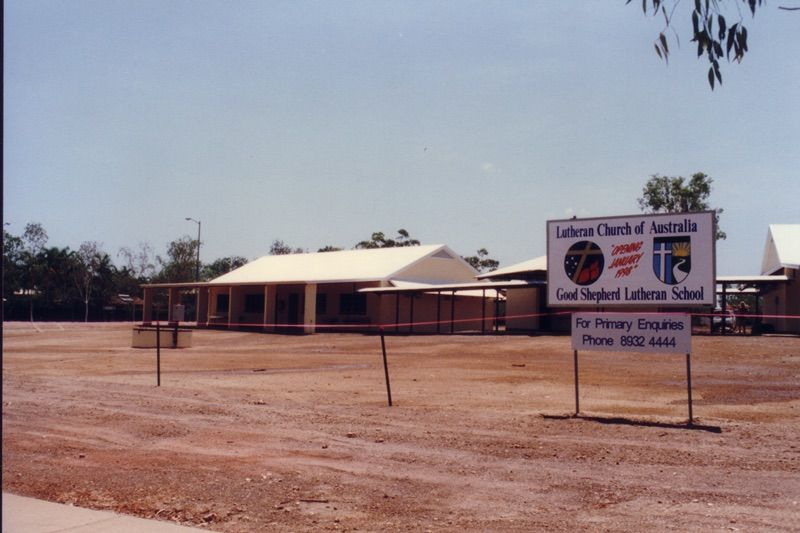Seeking to Serve The Community We Are In
This title may refer to the whole community or more likely to sub community that relates to a particular school. Part of a community may seek Steiner education or an Islamic school. It may seek a school exclusively for Aboriginal students or one with a mix of students. It may be one attracted to overseas exchanges, international engagement and outdoor education or another desiring a Montessori culture. It may want a Christian School. There are those that want a Lutheran education.
Probably a school will struggle if it’s not offering what its community wants and a Principal will be unhappy if they don’t believe in what the community really desires. Change may be an important part of meeting the needs of a particular sub community. It takes vision and courage for a Principal to change the direction of a school so that it will better serve their particular community. Carrying on with the status quo is likely to be much easier than making a change even though the change may result in a positive acceptable difference.
Overall I’m really impressed by our 25 schools as they continue the ongoing journey in such a way so they present as well as they can in serving their communities. Our 25 schools are not all the same but they do generate a colourful mosaic of relevance and service which does make a positive difference to the community of the Northern Territory. What is wanted in remote Arnhem Land is not the same as that desired in Darwin or Alice, though there may be some similarities.
A school I enjoyed visiting on a couple of occasions was Abbotsholme, set in the Midlands countryside of England on the banks of the River Dove in Derbyshire, near the county border and village of Rocester in Staffordshire. The campus is 140 acres. The school was delightful, innovative, creative and motivated. St Philips had hosted exchanges from the school and some of our students had travelled to have the Abbotsholme experience which they enjoyed.
The founder of the school was Cecil Reddie and the foundation date was 1889.The school has survived on the original campus. I find the founding of schools interesting even though it may have been a long time ago. Those responsible were, even then, visionaries, risk takers and trying to do the best by their particular communities. Not always, but often, the respect for the founders is not lost but trickles down through the ages. Though much will change from its foundation the effect on the school culture and its meaning may still be respected. It is true that someone has to give birth to a school’s culture and often that is the founders.
On my first visit to Abbotsholme I stayed with the Head and his family on campus and had the opportunity to attend a presentation to former students by an old student of note. I thoroughly enjoyed this and was impressed by the respect the students had for the school and its ethos. One of the aspects of the school, which they remembered fondly, was the opportunity for small groups to head off on expeditions during the weekend, by themselves, with no supervising teacher. They appreciated the trust placed in them. Of course the school then was a full boarding school. Cecil Reddie produced the thought provoking school motto: “Glad Day, Love and Duty” and it still remains as the school motto, no doubt journeying down the road of relevance to fit with the times.
Though born in London of Scottish Parents, Reddie was orphaned when he was young and ultimately found himself at the prestigious boarding school, Fettes, in Edinburgh. I have visited Fettes and it is also an impressive school built around amazing architecture. The Scots had and still have a fine reputation for education.
Reddie didn’t enjoy Fettes and it is likely that put him on track to founding a school which was to be considered progressive in its education, philosophies and theories. The traditional English Private School (known as a Public School) at that time, was based around the Classics and featured the traditional languages of Latin and Greek. Corporal punishment was part of the deal as was compulsory sport. These students were being trained to take their place as leaders in British Society and there were high and prescriptive expectations placed on them.
Reddie saw that this style of conservative education missed the mark for many students. In an age where the classics outweighed the sciences, Reddie had studied medicine, physics, mathematics and chemistry at Edinburgh University and then Gottingen University in Germany, where he obtained a doctorate in chemistry. At Gottingen he was greatly impressed by the education theories presented. In the meantime he developed an appreciation for socialism and he felt moved to establish a school based on socialist principles.
The school was opened in 1889 and was for boys aged 10 to 19. From the start he moved away from the traditional public school model in favour of a less rigid school environment and a more liberal education. Uniforms in Public Schools were usually very formal and uncomfortable. Reddie had a uniform designed which was much more comfortable and practical. Modern languages, English, French and German were taught in place of Latin and Greek. Fine arts was introduced as a core subject. This was considered unusual at the time as music was mostly taught in cathedral schools and at specialist art institutes. Practical skills such as animal husbandry and carpentry were integrated into the curriculum. He rejected corporal punishment substituting instead the principles of self- discipline and tutoring. He radically de emphasised the role of rote learning.
“Cultural spill-over” is a concept worth analysing. There can often be “cultural spill-over” from an interesting school. Reddie was not shy at engaging foreign teachers who appreciated the Abbotsholme principles. Some would return to their country and set up schools along the same line. Before his move into education Kurt Hahn visited Abbotsholme and he admits to Reddie’s approach having an influence on him, which can be seen clearly in his schools, Salem (Germany) and Gordonstoun (Scotland).Though I haven’t been able to establish the fact that Reddie influenced Hahn’s creation of the Duke of Edinburgh Award, it is said that he did.
Reddie’s creative presentation, which was an example to the students, is the memorial to those from Abbotsholme who gave their lives in the First World War. This is in the school hall and the date of the conflict is not 1914-1918 but rather 1914-1921(?) because Reddie believed that the war hadn’t finished until the last German prisoner was sent home.
Some of Reddie’s ideas were eccentric such as his dislike of using capital letters. In fact I noticed the writing on the War Memorial was all in lower case! I don’t know what this says but it does identify someone with strong and sometimes unusual opinions. Reddie’s focus was always on the 3 Rs: “Head, Hands, Heart” which was truly nailed into the culture of the school.
However, this innovative school did not become co-educational until 1969 well after Reddie died in 1932.
The school has evolved as one would expect but underlying its evolution is the basic culture established by Reddie. For years now the school has had a working farm of 70 acres, emphasising sustainable practices. The school now goes from Reception to Year 12. All pupils play an active role in the farm up to Year 9. In year 10 pupils can choose to study Agriculture, Estate Management or Equestrian Studies as part of a tailored program. The Boarding House kitchen provides healthy meals directly from the farm. “Our lambing season is a magical time on the farm.” Older students work with the school’s breeding sheep flock and pedigree “British White Cattle herd.”
The school had a Cricket Exchange program where students from overseas could come and share a term and play cricket with the school’s team.
Reddie had the creativity and courage to offer a school with his more liberal and thoughtful ideas on education. However he was not popular with everyone and as time went on he had difficulties in the school, particularly with staff. Some say he started to appoint “yes people” to avoid conflict. Such people may not be good at communicating difficulties. Sadly his unpopularity grew and in 1927, when he retired, he only had two pupils left. This highlights the major importance of Principals always keeping their eye on the market and their need to be sensitive to the communities they serve. There is little point in being the school which is serving the particular community when the reality is otherwise.
I learnt that, despite having strong opinions and beliefs about education, if these weren’t supported by the community and if I was not going to change then the school would be no place for me.
Abbotsholme did revive and of course it is flourishing today, with the basic school culture still intact. However it is worth considering that, when a radical change is introduced it is important to modify it to make it relevant to the times in which the school is existing. Whilst the school does cater for pupils across the spectrum it also caters well for students requiring alternative learning strategies. Boarding can be accessed daily, weekly or full boarding, which shows the school is flexible and has its eye on the community it serves.
Abbotsholme, in its creative journey, entered an era not familiar to most Australian Independent Schools. In 2017 the school was bought by the Chinese company Achieve Education Ltd owned by Mrs Tong Zhou. However the story of this new journey for Abbotsholme is for another day.
As I have explained before, leading a school is like sailing a ship, turning the wheel to deal with dangers, tides, weather and simply the journey, with sails being let out and pulled in according to the conditions. Nothing is to be gained by sailing towards disaster though a Principal has to be always aware of potential disasters and from where they may come.
Some points to consider from the story, rather than the weekly quotes.
It is valuable to understand why a founder or founders start a school.
It is helpful to understand the characteristics of the founder.
Consider whether the founder’s time at the school remained positive or changed and if so, why it changed.
Consider whether the community remained the same or changed over the time and how it changed.
Was the founding head able to make changes in line with the community?
In your experience does cultural spill-over occur?
Why can “yes people” be limiting? (Consider the story of “The Emperor’s New Clothes”).
Chris Tudor
Principal Liaison & AISNT Historian



